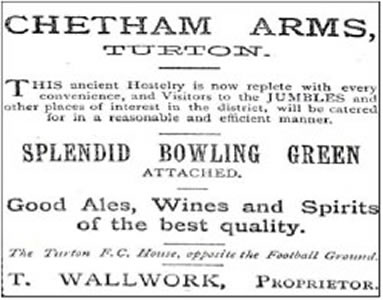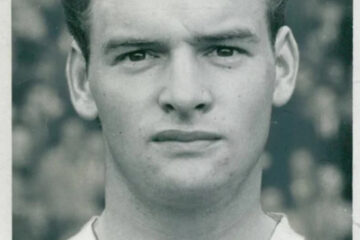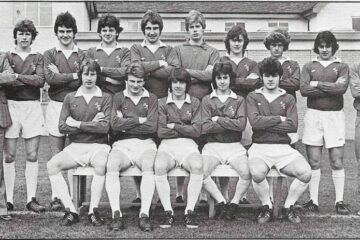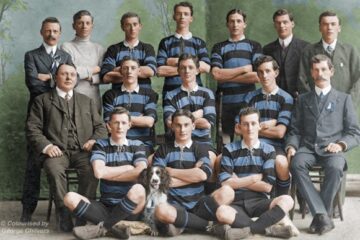When the draw for the Second Round of the 1881-82* Lancashire FA knockout gave Everton an away tie at Turton, the Everton club secretary, John W Clarke, quickly consulted his Bradshaw’s Railway Guide before making his way down to the local offices of the Lancashire & Yorkshire Railway Company on Tithebarn Street in Liverpool. Once there, he made the travel arrangements for himself and his players to compete in this important cup tie.
So it was that, on Saturday, 10 December 1881*, the intrepid members of Everton Football Club boarded the express train which, after making one stop at Wigan, deposited them safely at Trinity Street Station in Bolton. The journey time was 45 minutes. Here they changed trains and, following a 15-minute journey, they reached their intended destination. They were greeted on the station platform and then escorted down a steep cobbled lane, to the headquarters of Turton FC at the Chetham Arms.
[* NB. The same article on ToffeeWeb erroneously records the date as 13 December 1882 in the 1882/83 season. The dates stated above on here, the EFC Heritage Society website, are correct.]

Their hosts were the oldest football club in Lancashire who, along with Darwen, had founded the Lancashire FA in 1878. The rules of association football had been brought to the area from Harrow Public School, by the sons of the wealthy Kaye family who lived in the local manor house. The roots of the game were then planted amongst the young men who worked in the several cotton mills and bleach works, set along the banks of Bradshaw Brook, in this small community, population 5,653 who lived high on the moorlands of Lancashire.
John W Clarke, upon his arrival, would have no doubt acquainted himself with his resident counterpart, John James Bentley, the 22-year-old son of the local shopkeeper, who now worked as an accountant in Bolton. He was the Secretary/Treasurer of his local football club and, as club captain, was one of their best players.
The two sides changed in the upstairs rooms of the Chetham Arms before descending the back staircase to rattle their way across the cobbles to the enclosed ground at the top of Tower Street. The Everton players would have, no doubt, been surprised the see the indigenous population queuing to pay for the privilege of watching them play, because there is no record of this having been done before. The game was popular in this remote corner of Lancashire, where association football was the main source of entertainment for the mill workers who could now spend Saturday afternoon at their leisure.
The visitors lined up in 2-2-6 formation in front of George Bargery, who was the Everton goalkeeper. Tom Evans and Tom Marriott played at full-back while the half-back positions were occupied by Tom Morris and Bill Parry. Provan and Williams formed a right-wing partnership while Gibson and Richards did likewise on the left. The centre partnership was formed by Frank Brettell and skipper Jack McGill who began the game on behalf of Everton.
The visitors, in the match that followed, gave a good account of themselves but were, eventually beaten by their much more experienced opponents. Turton went ahead after 10 minutes with a goal from Hamer and then increased their lead with a second goal that was scrimmaged through by their forwards. The home side were playing much more of a passing game than that of their visitors and it was one such move, began by John Bentley that culminated in a third goal, scored by Halliwell.
The play then changed direction. Everton, during the second half, had a lot more of the game and pulled back a goal in the later stages of the tie. They then exited the tournament on a 3-1 defeat. Darkness had begun to engulf the Turton enclosure when Everton scored their goal so the name of the man who got the final touch was not recorded and remains, to this day, missing from the official club records.
[Match reports at the end of the article]
The players, after the game, would have mixed well together in the shelter of the Chetham Arms, where the demands of hospitality would have been honourably executed while many a foaming glass, to the honour of their hosts, would have been raised high by the Everton players. William Clarke and John Bentley would have then executed their secretarial duties before the Everton players were escorted back to the railway station to begin the first leg of their journey back home to Liverpool.

John Bentley, when returning to the Turton headquarters, would have sent the result of the game, by telegraph, to the Secretary of the Lancashire FA. He also would have informed him of the sum of money, which amounted to three shillings and nine pence, that had been taken at gate. The secretary then entered these two items in the Minute Book and, in doing so, thus recorded the first gate receipts, to be taken at a match, which involved Everton Football Club. They may be seen to-day at the headquarters of the Lancashire FA at Leyland near Preston.
This was to be the only football-related meeting between William J Clarke and John Bentley as both men then went their own ways in life. J J Bentley, however, would become the more famous. In 1885, he became the manager of Bolton Wanderers, for one season, and returned to manage them again between the years of 1887 to 1895. He later became co-editor of the Manchester-based sports journal, The Athletic News and was a free-lance journalist with several national newspapers. In 1888, he collaborated with William McGregor in bringing together the leading clubs from the North West and Midland regions of England to form the Football League and, eventually, to became its president in 1894.
In 1899, he returned to manage Turton FC, before leaving them to become the secretary of Manchester United in 1912. He remained at Old Trafford, in one capacity or another, until ill health forced his retirement in 1916. He spent the final years of his life with his wife and three children in the Chapeltown area of Turton until his death in 1918; he was buried in the local churchyard. Turton FC folded during World War One but reformed again and still play today in the neighbouring village of Edgeworth. The old Turton ground, on Tower Street, was later taken over by the Old Boltonian’s Football Club and remains today – in all probability, the oldest football ground in England.
William J Clarke was born in 1855 in the Leicestershire town of Melton Mowbray where his father was a local publican. The family later moved to the Basford area of Nottinghamshire. The 1871 census records William, by then seventeen, as working, as an Assistant School Master, at 13 St Paul Street in the Lincolnshire town of Stamford. He was teaching at a boys’ boarding school run by Mr David Bloodworth, along with his wife, Sarah. William J Clark is first recorded as playing for Everton during the 1880-81 football season while he was living along with parents at the Queens Arms public house at 22 Village Street in Liverpool. He also held the office of Club Treasurer. The following season, with his playing days coming to an end, William J Clarke took over the role of club Secretary from Mr W Lowe, and held this position for one year before handing over to Frank Brettell.
By 1891, William had married Mary Ellen Bradshaw and was living at 35 Corholme Road in the City of Lincoln with his widowed mother-in-law, Sarah, who listed her occupation as that of a General Dealer. William was employed as a General Dealer’s Assistant. His wife has been born in the Laisterdyke area of Bradford while her mother hailed from Colne in Lancashire. William and Mary Ellen had one daughter, whose name was Margaret, born in Lincoln.
The 1901 census revealed that these circumstances had not changed. William J Clarke, a former secretary of Everton Football Club, lived at the same address, and, worked at the same occupation, until his death on 15 December 1908 at the age of fifty-three.
………………………………………………………………………………………………
Match reports (thanks to transcriptions made by Billy Smith of bluecorrespondent.co.uk)
TURTON V EVERTON
Bolton Evening News – Monday 12 December 1881
These teams met on Saturday to decide their tie in the second round for the above cup, on the ground of the former. The home team were minus the services, through indisposition, of H. brown, and R. Trainer, the place of the former being supplied by an entirely new man, viz., J. Raby, who turned out to be a pretty fair substitute. The home team lost the toss, and J. Haworth kicked off about 3.20. In five minutes Hamer scored first blood for Turton, and for a short time after play was of an even character, the leather travelling rapidly to each end of the field, and them from a scrimmage Turties scored a second goal. Directly after the kick off from the centre the visitors had a free kick in the Turton goal, but nothing resulted from it. Bentley now made a good run, and passing cleverly to J. Haworth that player put the ball to Halliwell, who placed a third goal to the credit of his side. Up to the call of half-time no further score was made. Everton now kicked off and Turton soon got a corner but it proved unavailing, and the visitors making a rush placed the Turton goal in jeopardy but Trainor and Greenhalgh saved their charge capitally. Following up the ball well, H. Howarth made an excellent shot, but the Everton goalkeeper grandly put the ball out of danger. McGill now distinguished himself as also did proven but the home team backs were in excellent form, and their efforts at scoring proved futile. Bentley now put in another clever run, and placing the ball well in the centre Halliwell shot and sent the leather between the uprights for the Turton, but the score was disallowed on the ground of off-side. Everton now made a delightful rush and their efforts were forwarded Raby the home keeper failing in attempting to save. From now to the call of time play was very even, and Turton left the field victors by three goals to one. Teams;- Turton; Raby, goal; Trainor, and Greenhalgh, backs; Seed and Tootill, half-backs; Bentley (Captain), and Rothwell, rights; Halliwell, and Hamer, left; J. and H Haworth, centres; W.T. Dixon, umpire.. Everton; G. Bargery, goal; T. Evans and T. Marriott, backs; F.W. Morris, and W. Parry, half-backs; A. Provan, and D.G. Williams, right; J. Richards, and W. Gibson, left; J. McGill and F. Brettell, centre; Umpire, T.H. Clark, Referee; Mr. N.T. Walsh, Darwen.
LANCASHIRE ASSOCIATION CHALLENGE CUP
Liverpool Daily Post- Monday, December 12, 1881
TURTON V EVERTON
The team of the Turton club who have to meet Darwen in the third round of the National Association Cup, were opposed to the Everton representatives on Saturday, at Turton, the home team winning by three goals to one.
Turton v Everton
The Daily Courier, December 13th 1881.
This match in the second round of the Lancashire Challenge Cup competition was played at Turton on Saturday. Neither side was represented by a full strength, but a good game resulted nevertheless. The visitors winning the toss, the ball was kicked off by J. Howarth for the home players. In five minutes the first goal was secured by Hamer for Turton, and then from a scrimmage Turton added a second goal. Shortly after restarting, Everton had a free kick, but nothing can of it. Bentley then made a good run, and passing neatly to J. Haworth, the latter transferred it to Halliwell, who sent the ball through the posts for the third time. No further score was made up to the call of half-time. The visitors, after kicking off jeopardised their antagonists’ goal, but W. Trainor and Greenhalgh saved their charge capitally. Following up well, H. Haworth made a clever shot, which was as cleverly stopped by the goalkeeper. McGill now distinguished himself, as did Provan, but the home team backs were in capital form, prevented the visitors from scoring. Bentley was again prominent with another good run, and centring the ball, Halliwell rushed up and shot it under the bar, but it was disallowed on the plea of “offside.” Everton made a determined rush, and their efforts were rewarded with a goal, the keeper falling in attempting to stop the ball. Up to the finish play was very even, and Turton left the field the winners by three goals to one. Teams; – Turton; – Raby, goal; Trainor and Greenhalgh, backs; Seed and Tootbill, half-backs; Bentley (captain), Rothwell, Halliwell, Hamer, and J. and H. Haworth, forwards. Everton; – Bargery, goal; Evans and Marriott, backs; Morris, and Parry, half-backs; Proven, Williams, McGill (captain), Brettell, J. Richards, and Gibson, forwards.
ASSOCIATION
Liverpool Daily Post – Saturday 17 December 1881
At length Everton (Association) have had to succumb. On Saturday, in playing off with Turton in the second round the Lancashire Association Challenge Cup, they lost by three goals to one. Everton have had a most wonderful run of luck, as I believe up to this match they had not lost a goal for fully a twelvemonth.
Bootle, Everton v Bootle (Second teams) (A)
Stanley Park, Oswestry v Everton (A)
TURTON MATCH
Athletic News – Wednesday 21 December 1881
Referring to the Lancashire Cup-tie between Turton and Everton clubs, the author of the “Evertonian” football notes in a Liverpool contemporary writes as follows; – “As may be surmised, when the telegram arrived from Turton on Saturday evening, the burden of the song in the Everton was ‘the spell is broken,’ for the last link that attached Liverpool to the country trophy had snapped asunder. The beating by three goals to one was not crushing; but for this result those who advocated a change of the tactics which have so long ensued victory are chiefly responsible. Deviation from a clearly defined track is the sure precursor of disaster and the Evertonians will now have learned the truth of the adage ‘older and wiser.’ The game, to all appearance, was literally thrown away. Recently we saw Everton by two goals beat Northwich Victoria, holders of the Cheshire Cup, who in turn, played a drawn game with Stoke-on-Trent, whilst the latter a week ago absolutely drew with Aston Villa. But experience is the best of teachers, and the lesson ought not to be lost sight of.”
I don’t know what the Turton people will think about the Everton men “literally throwing the game away,” bit I should think that it would always be odds on Turton beating Everton. The inference to be drawn from the last part of the extract is that Everton is a two goals better team than the Aston Villa! Reasoning in the same manner the Blackburn Olympic must be nine goals better than the Aston Villa because the first-named team beat the Northwich Victoria by nine goals to nil!



